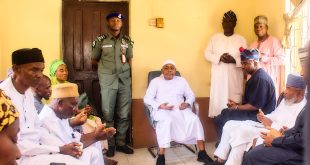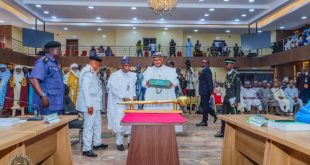By JAMES SWAM
Following Governor Uba Sani’s explosive revelation in March regarding the actual debt profile of Kaduna state and its impact on development, revenue-generating agencies in the state have been making efforts to compel defaulting organisations to remit tax owed to the state. These efforts, championed by the Kaduna State Internal Revenue Service (KADIRS), are significant as the budget year enters its second quarter.
The state’s 2024 Internally Generated Revenue (IGR) estimate of N120 billion is higher than the previous year’s with a significant margin of N31 billion. With about 75% of the federal allocation being deducted at the source to service debts, Governor Uba Sani assembled a formidable team of tax experts to raise finance for development. While some stakeholders consider this goal “ambitious,” it remains a daunting task that the team at KADIRS, led by Jerry Adams, is determined to tackle and overcome.
At the signing of the appropriation bill into law in December 2023 christened “Rural Transformation for Inclusive Development”, the governor mandated the KADIRS to acknowledge its role in the effective implementation of the budget. He also charged ministries, departments, and agencies (MDAs) as well as “government-owned enterprises” to evolve strategies to meet the revenue generation target.
But specifically, the governor is hopeful that as the chief revenue-generating agency, KADIRS would speed up its activities by hunting every defaulting organisation. He said “KADIRS must sustain the current momentum of our revenue generation drive” by taking bold steps to explore various avenues. Governor Uba Sani has given the Internal Revenue Service a marching order to ensure it meets the N120 billion IGR target.
Since April, significant steps have been taken by the KADIRS to address gaps in revenue generation. Big corporate entities have been sanctioned, with many having their facilities sealed without fear or favour. This indicates that the government is committed to enforcing reforms in the sector. Relying on Section 104, sub-sections 3 and 4 of the Personal Income Tax (Amendment) Act, 2011, and Section 37, sub-sections 3 and 4 of the Kaduna State Tax Codification and Consolidation Law, 2020, KADIRS is sparing no entity caught defaulting.
Acting on these relevant legal provisions empowering it to discipline companies that fail to remit taxes due to the state, the Revenue Service is leaving no stone unturned. The first target was one of the biggest commercial banks, the United Bank for Africa (UBA), which had six of its branches sealed by the enforcement team for non-remittance of taxes from 2019 to 2021 running into millions of naira. For KADIRS, this bold, aggressive action was intended to send a warning signal to other defaulters.
The following week, the enforcement team moved to the telecommunications sector, sending shivers down the spine of corporate organisations. Major players in the sector, including MTN, Globacom, 9-Mobile, and Airtel, had their masts sealed. About 10 masts operated by IHS and ATC in various locations in the city, servicing these giant telcos accused of defaulting to the tune of N5.8 billion were sealed.
The KADIRS did not stop there. It targeted hotels, media organizations, hospitals, health facilities suppliers, fuel stations, event centers, and numerous other businesses. For instance, the Admiralty Hotel, owned by the Nigerian Navy, and the popular Liberty Radio/TV, located in an upscale area of the city, were sealed. By the end of the exercise, about 30 business premises were affected. One of the organisations was “partially distrained,” according to the KADIRS.
The aggressive measures undertaken by the revenue service to address organisations evading tax remittance are projected to significantly boost revenue. Many corporate entities operating in the state have been intentionally avoiding their responsibilities. The KADIRS strategy of naming and shaming these entities is therefore expected to pressure them into compliance.
Jerry Adams, the executive chairman of KADIRS, is optimistic that the current reforms will motivate his team to work harder to provoke increase in the internally generated revenue (IGR) necessary to support the 2024 budget, in line with the governor’s mandate and expectations. Since January, numerous activities have aimed at accelerating tax collection and encouraging defaulters to fulfill their obligations, while also recognising firms that remit taxes promptly.
KADIRS has implemented several initiatives to change the narrative, including the launch of the Central Billing System to coordinate revenue-generating agencies’ activities and monitor daily performance, the activation of the Withholding Tax on Rent, the inauguration of the Kaduna State Joint Revenue Committee, and the reintroduction of strategic retreats for capacity development to
enhance workers’ skills in modern tax administration. These measures are expected to significantly improve performance and yield positive results.
It is noteworthy to state that Governor Uba Sani’s ambition to increase IGR is well-founded and aligned with the goals of the KADIRS chairman. The reforms undertaken at KADIRS indicate that efforts to meet the targeted revenue are progressing well.
James Swam, former Press Secretary to the Deputy Governor of Kaduna State and Secretary of the Nigerian Institute of Public Relations, Kaduna Chapter, is the author of _How to be an Effective Spokesperson_ .
 THESHIELD Garkuwa
THESHIELD Garkuwa




